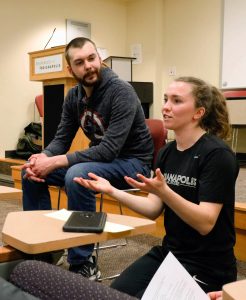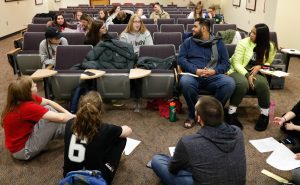TED Talks are synonymous with education and learning. Covering a wide variety of topics ranging from social media to power posing, TED Talks have the capacity to educate, inform and cultivate minds across the world. At the University of Indianapolis, particularly, they are being used to bring people of different backgrounds and majors together in order to seek out solutions to difficult world topics. Three times a semester, according to senior psychology major Corey Nack, various students gather together to view and discuss a TED Talk.
After Anne Moelk discussed UIndy PACT with the group, Corey Nack and Laura McKee led the group in discussing any comments before the video.
“The idea is, pick a topic that applies to a lot of people in the world, that is very difficult to solve, that there’s a lot of different perspectives on, and get them to talk about what they know. Then we watch a TED Talk and see if we can come up with some ideas together,” Nack said. “The goal is that you look at everything like it’s a problem that might not have an easy solution, but you may have a part in solving.”
On Wednesday, Feb. 28, the topic on the table was how to address sexual assault, harassment and bullying, especially online and on social media. Title IX Coordinator Anne Moelk opened up the event with a few words about the importance of the UIndy PACT.
“The UIndy PACT stands for protect, advocate, communicate and transform. We’re asking students, faculty and staff to sign the PACT and basically make a commitment to being the kind of community member you want to see other people be,” Moelk said. “So, if I want to see good things happening on my campus, I have to be a person who demands good things that happen on my campus.”
Moelk reminded the attendees that the UIndy PACT could easily be found on the MyUIndy page, noting it would be hugely beneficial to creating a culture of awareness on campus. Among other things, Moelk noted the crucial importance of being an upstander and not a bystander, using the PACT to emphasize how integral it is that the campus community stand together and take care of one another.
“…Look at everything like it’s a problem… you may have a part in solving.”
Afterwards, the evening was structured in three parts: previewing questions, the viewing of the actual TED Talk and post-viewing questions. Previewing questions addressed how face-to-face communication differs from online communication and how these different forms of interaction affect sensitive conversation topics like sexual assault.
The actual TED Talk viewed was Ione Wells’ “How We Talk About Sexual Assault Online,” in which she graphically details her assault and how she began writing letters to cope with trauma. Eventually, she shared the letters online, and they grew viral—burgeoning into the international #NotGuilty campaign against sexual violence and misdirected victim blaming.In the Talk, Wells noted how the hashtag was a way to hold her attacker, and numerous others accountable.
TED Talk discussion sessions help students learn more about the featured subject, which are chosen to relate to a people of different backgrounds.
“It was giving airtime to the topic of sexual assault, opening up discussions amongst friends, amongst families, in the media that had been closed for too long and stressing that victims shouldn’t feel to blame for what happened to them,” Wells said. “We might still have a long way to go in solving this problem entirely. But in this way, we can begin to use social media as an active tool for social justice.”
During the post-viewing question session, the room divided into groups to discuss the talk, addressing issues such as victim blaming and online harassment. Senior biology major Laura McKee said that one particular powerful moment in Wells’ talk that stood out to her was about the perseverance of a survivor.
“I like the part where she talked about how her parents said, after the bombings, you have to get back on the tubes the next day to show them who is in charge. I had never considered that,” McKee said. “No matter what, you’ll still get home on the last train, you’ll still walk home by yourself, just to show that this isn’t their [the rapist’s] world.”








